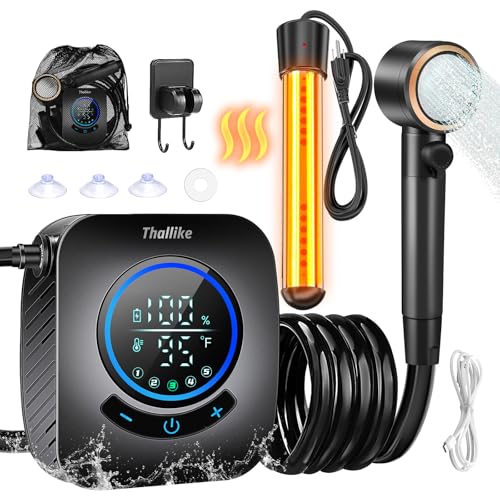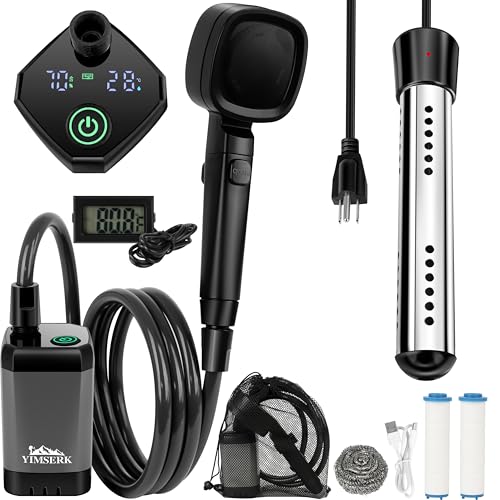Quick Overview: This guide compares portable units that provide heat for space or water on the go, including electric heated shower pumps, propane tankless water heaters, and a portable air conditioner with heating capability. Below is a summary table of the five selected products so you can scan core use cases quickly.
| Product | Type | Key Feature |
|---|---|---|
| Whynter 14,000 BTU AC & Heater | Portable AC With Heat | Dual-hose cooling plus heat function for rooms |
| CAMPLUX 5L Propane Tankless Heater | Propane Tankless Water Heater | On-demand hot water, battery-start pump |
| Kohree Helios 20 Pro | Propane/Rechargeable Water Heater | 20,000 BTU output, rechargeable battery |
| Thallike Portable Heated Shower | Electric Immersion Heated Shower | 1500W immersion heater, 8000mAh battery |
| Yimserk 2000W Heated Camping Shower | Electric Immersion Heated Shower | 2000W heater, filtered 4-mode head |
Whynter 14,000 BTU AC & Heater

The Whynter ARC-14SH is a portable air conditioner with heating capability designed for enclosed spaces up to 500 sq. ft. It combines a cooling mode with an electric heat function and includes a dual-hose setup to improve efficiency for room air exchange.
- Core Features: 14,000 BTU cooling (9,200 SACC), built-in dehumidifier, dual-hose design, 51 dBA at low speed.
- Performance Notes: Award recognition for overall performance indicates balanced cooling and noise management; the integrated dehumidifier handles up to 71 pints/day.
- Power & Installation: Requires standard household power; ships with a window kit for venting. The dual-hose setup often delivers improved efficiency compared to single-hose portable AC units.
CAMPLUX 5L Propane Tankless Heater

The CAMPLUX 5L model is a portable propane tankless water heater geared to outdoor use like camping, off-grid showers, or RV wash stations. It provides on-demand hot water and includes a low-power water pump option.
- Core Features: Lightweight at about 10 lb, 1.32 GPM hot water output, temperature range roughly 46.4°F–114.8°F.
- Power & Ignition: Battery-powered ignition with D batteries for pump start; useful where electric power is limited.
- Use Cases: Suited for continuous on-demand water heating for showers, dishwashing, or cleaning tools in remote locations.
Kohree Helios 20 Pro Water Heater

The Kohree Helios 20 Pro is a high-output portable water heater that blends a 20,000 BTU burner with an integrated 4000mAh rechargeable battery and shower pump, targeting fast hot-water delivery outdoors.
- Core Features: Up to 20,000 BTU thermal power, smart electronic temperature control, 3-second rapid heating claims.
- Battery & Runtime: Built-in 4,000 mAh battery for pump operation and supports charging while in use; quick-charge capability (80% in about 2 hours).
- Design Notes: Compact footprint with foldable and multiple handles for transport; intended for camping, fishing, and car-based travel.
Thallike Portable Heated Shower

The Thallike portable shower kit centers on a 1500W immersion heater paired with an 8000mAh rechargeable pump. It is configured for quick warm-water access from buckets and basins while camping or traveling.
- Core Features: 1500W heater, Type-C charging, 8000mAh battery offering up to 180 minutes of pump use.
- Safety & Monitoring: Digital thermometer and LCD display for battery and water temperature monitoring to reduce scalding risk.
- Portability: Very compact pump size and included mesh storage bag for kit organization during transport.
Yimserk 2000W Heated Camping Shower

The Yimserk unit combines a 2000W immersion heater with a 6000mAh battery and a filtered shower head. It is optimized for faster water heating and includes spray mode versatility for cleaning or showering.
- Core Features: 2000W heater capable of higher peak temperatures, stainless steel guard on heater element, LED screen for monitoring.
- Filtration & Spray Control: Built-in PP filter, four-mode spray head, and one-touch stop control for convenient use.
- Safety Notes: Includes thermometer and stainless guard; immersion heater requires full submersion when powered.
Buying Guide: How To Choose A Portable Heat Or Heater System
Choosing between a portable heat pump, electric immersion heater, or propane tankless unit depends on the target application: space heating, water heating, or combined climate control.
Define Your Primary Use
Decide whether you need space heating for rooms or water heating for showers and cleaning. Portable AC units with heat functions (like the Whynter) address space comfort. Immersion or tankless systems address on-demand hot water outdoors.
Heating Method And Efficiency
Heat Pump / Electric HVAC: Heat pumps move heat and usually offer higher efficiency for space warming compared to resistive heating, but require electric power and proper airflow/venting for portable units.
Resistive Electric Immersion Heaters: These convert electricity to heat directly and heat water quickly in buckets or tanks. They are simple and compact but draw high current (1500–2000W models).
Propane Tankless Heaters: Use combustion to heat water on-demand with high thermal output and independence from grid electricity. Good for off-grid scenarios but require propane fuel, ventilation, and safe operation around combustibles.
Power Source And Runtime
Match power needs to your available sources. Electric immersion units require AC or substantial inverter capacity for high-wattage heating. Battery-equipped pump units provide minutes to hours of water flow but usually rely on external power to run immersion elements.
Propane units operate independently of electrical supply for heating, but pumps or ignition may need batteries. For extended off-grid use, factor in fuel capacity or access to electricity for charging batteries.
Output Capacity And Performance Metrics
For space heating, compare BTU ratings and SACC (seasonally adjusted cooling capacity) equivalents if available. For water heaters, look at BTU or GPM ratings. Higher BTU/GPM equates to faster or more continuous hot water delivery.
Portability And Weight
Assess weight, handles, and footprint for transportation. Propane tankless units can be lightweight but require a propane cylinder. Electric immersion kits are typically compact but need water containers. Consider the full kit weight including hoses, batteries, and mounting hardware.
Safety Features And Certifications
Look for overheat protection, ground-fault protection (GFCI) where applicable, temperature displays, and proper guards for heating elements. For gas units, confirm safe ignition, flame sensing, and clear exhaust pathways to prevent carbon monoxide buildup.
Installation And Setup
Evaluate how the unit installs: window venting for portable ACs, hose and pump connections for water heaters, and simple drop-in immersion requirement for electric kits. Ease of use matters in field conditions—kits with mounting hooks, mesh bags, and integrated controls speed setup.
Noise And Comfort
For living spaces, noise levels (measured in dBA) affect comfort. Portable AC/heater units often list dBA at low speed; choose quieter models for bedrooms. For showers, pump noise and burner operation should be factored in if quiet is desired.
Maintenance And Durability
Review filter requirements, descaling procedures for water heaters, battery replacement, and the robustness of hoses and connectors. Propane systems need periodic checks for leaks; electric kits require careful handling of immersion elements to avoid dry-run damage.
Environmental And Fuel Considerations
Electric heat pumps and resistive heaters produce no combustion emissions on-site but depend on grid energy sources. Propane delivers portable high output but burns fossil fuel and requires safe storage. Choose based on your environmental priorities and fuel availability.
Cost Of Ownership
Beyond upfront cost, consider fuel consumption, battery replacement, filter replacements, and potential maintenance. Propane units incur ongoing fuel costs; electric immersion heaters may increase generator or inverter usage.
Comparison Perspectives
- Off-Grid Camping: Propane tankless heaters (CAMPLUX, Kohree) offer independence from electricity for heating water, making them strong picks for remote use.
- Car-Based or Short Trips: Battery-assisted portable shower pumps with immersion heaters (Thallike, Yimserk) balance compactness with convenience for quick warm rinses.
- Indoor Space Comfort: A portable AC with heating capability (Whynter) is a better match when the goal is room temperature control rather than water heating.
- Rapid Hot Water: High-BTU combustion units typically provide faster and more continuous hot water than small electric immersion setups.
- Energy Efficiency: Heat pump technology (in space heaters/ACs) tends to be more energy efficient for space heating than resistive elements.
Checklist Before Buying
- Identify primary function: space heat vs. water heat.
- Confirm available power sources (AC outlet, generator, battery, propane).
- Check output specs: BTU for space heating, BTU/GPM for water heating.
- Review safety features: overheat protection, GFCI, flame safety.
- Evaluate portability: weight, handles, kit completeness.
- Plan for maintenance: filters, descaling, battery cycles.
Common FAQs
Can immersion heaters run on battery power alone? Typically, the high wattage of immersion heaters requires AC power or a high-capacity inverter; only the pump is often battery-driven in combined kits.
Are propane tankless heaters safe for camping? Yes, when used outdoors with proper ventilation, secure propane connections, and following manufacturer instructions for ignition and flame detection.
Is a portable AC with a heat function a true heat pump? Many portable ACs include electric heating elements rather than a refrigeration heat-pump cycle; check product specifications to confirm whether heating is via heat pump or resistive elements.
Final Note: Choose the unit that aligns with your required function, power availability, and safety comfort level. Matching the technology—heat pump, resistive immersion, or propane combustion—to your use case will yield the most reliable performance in the field.
